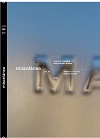Richard Ford's Frank Bascombe as an American Everyman
DOI:
https://doi.org/10.26754/ojs_misc/mj.20148780Palabras clave:
Identidad cultural, Mitos nacionales, Americanidad, Narrativa contemporánea, Literatura estadounidenseResumen
El narrador autodiegético de la trilogía Frank Bascombe de Richard Ford -compuesta por The Sportswriter (1986), Independence Day (1995) y The Lay of the Land (2006)- ha sido etiquetado por críticos y comentaristas como un estadounidense de a pie. Asimismo, el propio personaje se autodefine como una persona corriente capaz de encarnar importantes ideales culturales y mitos asociados a la cultura y la historia de los Estados Unidos. Partiendo de esta premisa, el presente artículo analiza y cuestiona las cualidades representativas de este epítome de la versión mainstream de la americanidad. Frank Bascombe es un ciudadano blanco, varón, heterosexual y de clase media en una nación regional, étnica y culturalmente diversa. Por ello, su papel autoasignado de persona corriente choca repetidamente con la realidad social de Estados Unidos y, al mismo tiempo, le hace anhelar una fuerte personalidad propia.
Descargas
Referencias
BERCOVITCH, Sacvan. 1975. The Puritan Origins of the American Self. New Haven and London: Yale U.P.
BONETTI, Kay. (1986) 2001. “An Interview with Richard Ford”. In Guagliardo, Huey (ed.) Conversations with Richard Ford. Jackson: University of Mississippi Press: 21-38.
BOORSTIN, Daniel J. 1965. The Americans: The National Experience. New York: Vintage.
CHERNECKY, William G. 2000. “‘Nostalgia Isn’t What It Used to Be’: Isolation and Alienation in the Frank Bascombe Novels”. In Guagliardo, Huey (ed.) Perspectives on Richard Ford. Jackson: University of Mississippi Press: 157-76.
DUFFY, Brian. 2008. Morality, Identity and Narrative in the Fiction of Richard Ford. Amsterdam-New York: Rodopi.
FORD, Richard. 1986. The Sportswriter. London: Bloomsbury.
—. 1995. Independence Day. London: The Harvill Press.
—. 2006. The Lay of the Land. London: Bloomsbury.
—. 2009. “Nobody’s Everyman”. Bookforum April/May 2009. <http://www.bookforum.com/inprint/016_01/3512>. Accessed December 18, 2012.
—. 2002. “How does being an American Inform What I Write?” Writers on America. Office of International Programs, US Department of State. . Accessed 18 December, 2012.
FUKUYAMA, Francis. 2012. “The Future of History”. Foreign Affairs 91 (1). . Accessed December 22, 2012.
GOODER, R.D. 1998. “Introduction”. In James, Henry. The Bostonians. Edited with an Introduction and Notes by R.D. Gooder. New York and Oxford: Oxford U.P.: vii-xxxiii.
GORNICK, Vivian. 2008. The Men in My Life. Cambridge: The MIT Press.
GUAGLIARDO, Huey. 2000. “The Marginal People in the Novels of Richard Ford”. In Guagliardo, Huey (ed.) Perspectives on Richard Ford. Jackson: University of Mississippi Press: 3-32.
—. 2001. “Introduction”. In Guagliardo, Huey (ed.) Conversations with Richard Ford. Jackson: University of Mississippi Press: vii-xii.
HOFFMAN, Alice. 1986. “A Wife Named X, a Poodle Named Elvis”. The New York Times. 23 March 1986: 14.
KIMMEL, Michael S. 2000. The Gendered Society. New York: Oxford U.P.
—. 2006. Manhood in America: A Cultural History. New York and Oxford: Oxford U.P.
LIPSTIZ, George. 2001. American Studies in a Moment of Danger. Minneapolis: University of Minnesota Press.
MORRISON, Toni. 1992. Playing in the Dark: Whiteness and the Literary Imagination. New York: Vintage.
SCOTT, A.O. 2006. “Intimations of Mortality”. The New York Times. 29 October 2006.<http://www.nytimes.com/2006/10/29/books/review/Scott.t.html?pagewanted=all>. Accessed December 21, 2012.
ZINN, Howard. (1980) 1995. A People’s History of the United States: 1492–Present. New York: Harper Perennial.
Descargas
Publicado
Número
Sección
Licencia

Esta obra está bajo una licencia internacional Creative Commons Atribución-NoComercial 4.0.


